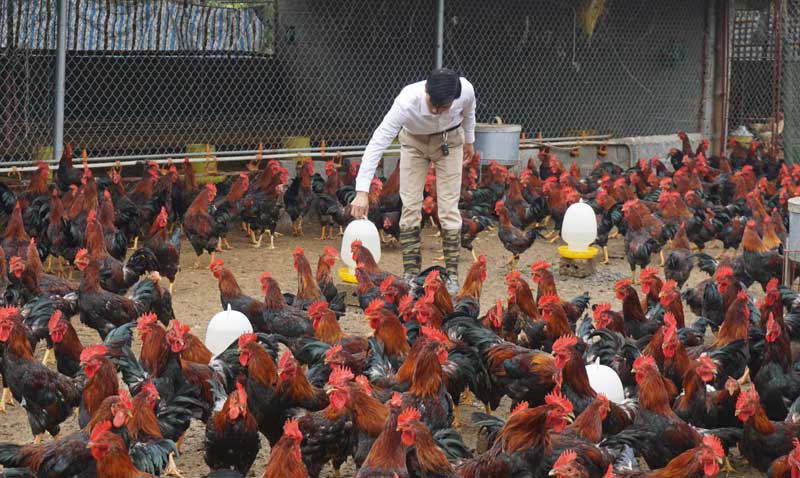
(HBO) – With the strong determination of the whole political system and the high consensus of the people, the building of new-style rural areas in Lac Thuy district, Hoa Binh province, has seen significant changes. The majority of officials and locals have become more aware of the matter and contributed to developing rural areas in many creative ways. So far, eight communes in the district have been recognised as new rural areas, including three particularly disadvantaged ones - Lien Hoa, Phu Thanh and Yen Bong. Lac Thuy is striving to become new-style rural area by 2020.
The district’s People’s
Committee has approved a project restructuring the agricultural sector towards
increasing added value and sustainable development between 2016 and 2020,
focusing on cultivation.
The district has established concentrated farm
produce production areas and large-scale fields. It is now home to 1,146
hectares of citrus fruits and 200 hectares of mixed plants.
Besides implementing the three value chains,
including two growing chilli for export and safe vegetable on 40 hectares and
one raising 10,000 chickens, the district has maintained the operation of farm
produce and safe food cooperatives, and attracted businesses to invest in
growing safe vegetable and medicinal plants according to value chain links such
as Lac Thuy Clean Agriculture Company, Vietnam Chilli Co., Ltd., Northern Green
Land Real Estate and Services JSC, and Sinh Loc Humanity Vocational Training
JSC.
As of 2018, the per capita income in the
district reached 38.9 million VND (1,659 USD), up 2.5 times against 2011. The
rate of poor households was brought down to 10.98 percent, or 10.42 percent
lower than the figure in 2011.
 Lac Thuy
district develops chains for raising chickens and builds brand for Lac Thuy
chicken.
Lac Thuy
district develops chains for raising chickens and builds brand for Lac Thuy
chicken.
Lac Thuy has built a roadmap to meet all the criteria
of the new-style rural building programme by 2020. The district strives to
continuously improve the eight recognised new rural communes as well as build
An Binh and Khoan Du into new rural areas in 2019 and An Lac, Dong Mon, and
Hung Thi in 2020./.
According to data from the Hoa Binh Provincial Party Committee, the industrial production index for the first six months of 2025 is estimated to have increased by 20% compared to the same period last year. This marks the highest year-on-year growth rate for this period since 2020.
In the first six months of 2025, Hoa Binh province’s export turnover was estimated at 1.145 billion USD, marking an 18.11% increase compared to the same period in 2024. Import turnover was estimated at $ 804 million, a 17.15% increase, which helped the province maintain a positive trade balance.
The lives of the ethnic minority farmers in Tan Lac district have gradually improved thanks to the new directions in agricultural production. This is a testament to the collective strength fostered through the professional associations and groups implemented by various levels of the district’s Farmers’ Union.
With the motto the "product quality comes first,” after nearly one year of establishment and operation, Muong village’s Clean Food Agricultural and Commercial Cooperative, located in Cau Hamlet, Hung Son Commune (Kim Boi district), has launched reputable, high-quality agricultural products to the market that are well-received by consumers. The products such as Muong village’s pork sausage, salt-cured chicken, and salt-cured pork hocks have gradually carved out a place in the market and they are on the path to obtaining the OCOP certification.
In the past, the phrase "bumper harvest, rock-bottom prices" was a familiar refrain for Vietnamese farmers engaged in fragmented, small-scale agriculture. But today, a new spirit is emerging across rural areas of Hoa Binh province - one of collaboration, organisation, and collective economic models that provide a stable foundation for production.
Maintaining growing area codes and packing facility codes in accordance with regulations is a mandatory requirement for agricultural products to be eligible for export. Recently, the Department of Agriculture and Environment of Hoa Binh province has intensified technical supervision of designated farming areas and packing facilities to safeguard the "green passport" that enables its products to access international markets.



 Lac Thuy
district develops chains for raising chickens and builds brand for Lac Thuy
chicken.
Lac Thuy
district develops chains for raising chickens and builds brand for Lac Thuy
chicken.